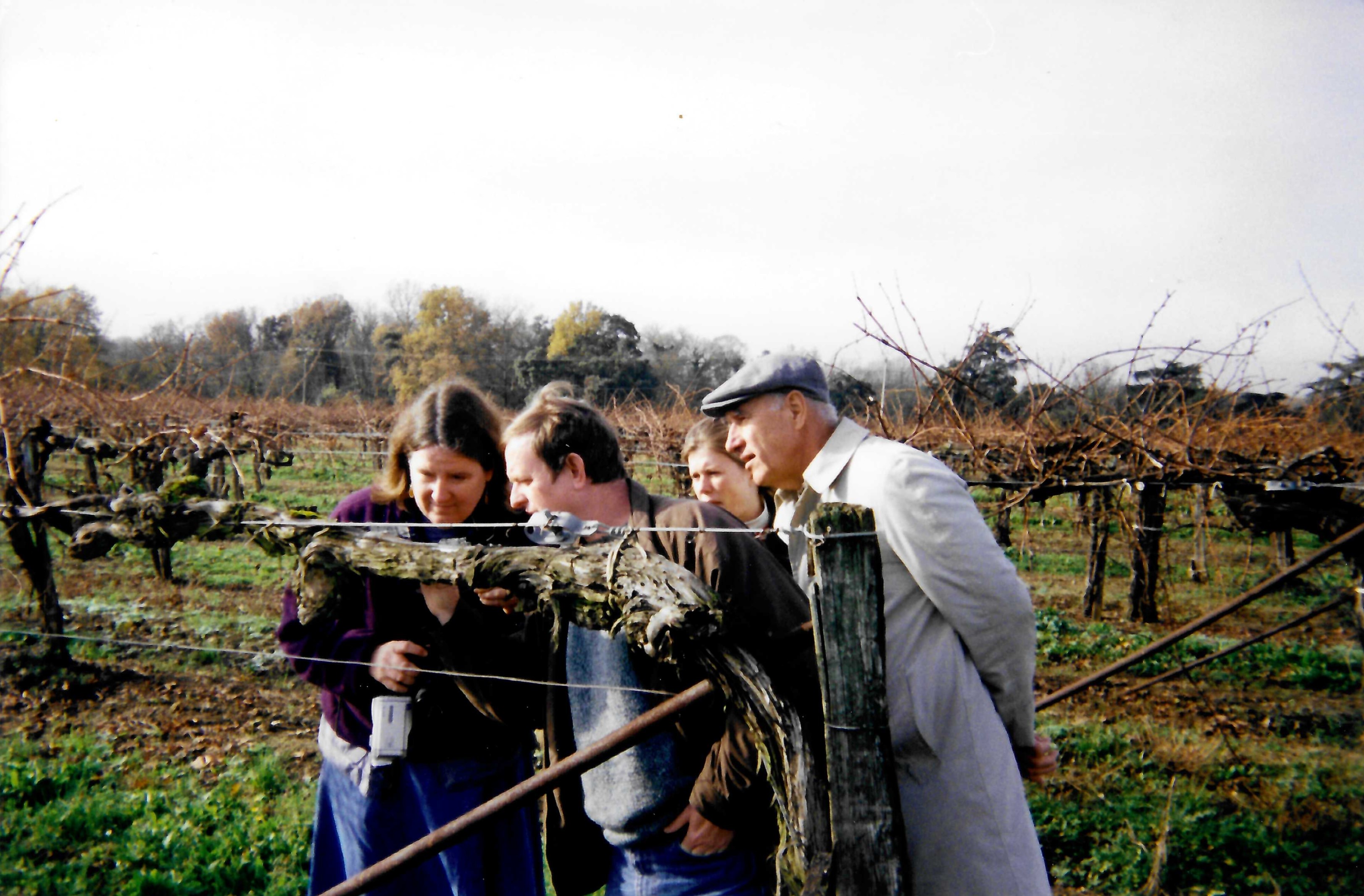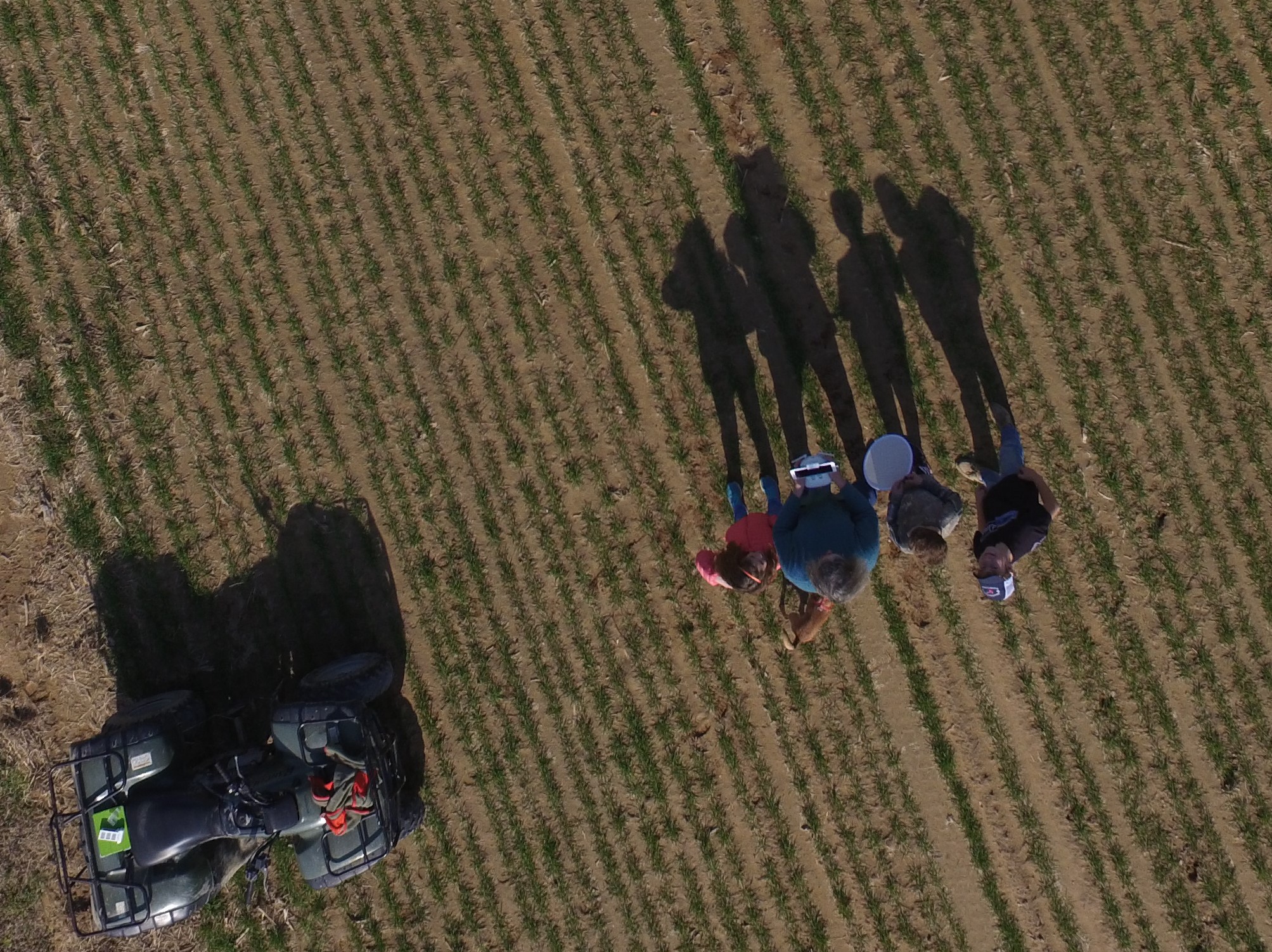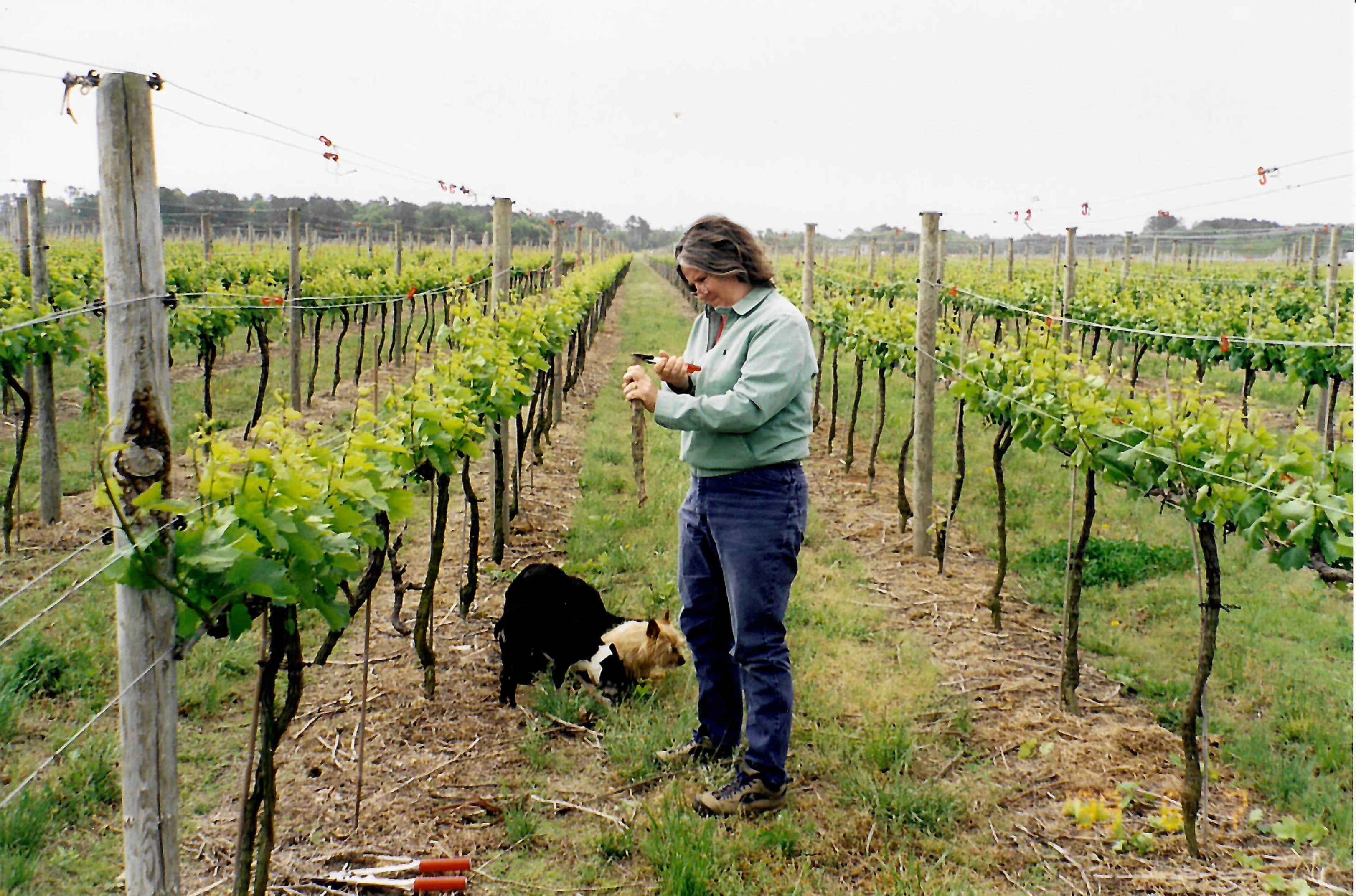Blog
Blog
Lucie Morton, internationally recognized as a viticulturist, ampelographer, consultant, research collaborator, author, lecturer and film producer, is a trailblazer with nearly 50 years of experience.
She’s also a treasure to Chatham Vineyards at Church Creek, where her expertise sought out before the first vine was planted laid the groundwork for vintners Jon and Mills Wehner to grow a sustainable business for this generation and the next.
Her history with Jon dates — shall we say — way back.
“I believe I was in diapers,” he says.
Lucie’s fondest early recollection takes her back to 1975 when she was on the back of a motorcycle steered by winemaker Eric Miller. Miller, founder of Chaddsford Winery, was helping Lucie make her first vintage. They biked to Great Falls, Virginia, where Jon’s parents, Joan and Harrison, operated their own vineyard, Great Falls Vineyard, on an acre and a half.

“While I was in the vineyard talking to them about Vidal Blanc, Jon got to tool around on Eric’s Beamer,” Lucie recalls.
The first time Lucie was paid to be a vineyard consultant it was Joan and Harrison who wrote the check. Both were eager to learn everything they could about grape growing. The friendship sprouted, and fun fact: It was through the Wehners that Lucie met her future in-laws before she ever laid eyes on her future husband. Joan invited Lucie to a dinner that included neighbors, Bill and Lucy Garrett, also vintners. Lucie later married their son, Ken, and they had two daughters. Second fun fact from that evening: Lucie asked Joan if she could bring along Leon Adams. Adams, the author of “The Wines of America,” was considered the seminal wine historian in the United States.
Joan was floored at the idea of such a celebrity dining in her home. “You mean the Leon Adams?!”
Lucie says today, “Grapevines have been good to me. It all began personally for me with my father wanting to plant grapes at Morland and professionally, it began with the Wehners.”
Virginia winemaking was in its infancy back then when many families were enthusiastic about growing grapes as a side hustle. But unlike many of the families from that period, Harrison and Joan weren’t looking to expediate the process to reach the fun part — winemaking.
“Back then everybody had a vineyard, and frankly, it was pretty much amateur hour,” Lucie says. “People didn’t really understand about wine grape growing. The fact that the Wehners hired me showed that they understood there was a lot to learn. Some think of the vineyard as a necessary nuisance. The Wehners were all about the vineyard.”
That’s a trait their son, Jon, inherited. In the late 1990s, Jon was in his late 20s, making good money in the D.C. area, on a path to marry his longtime girlfriend, Mills. He surprised his father one evening at the dining room table by announcing what he refers to as a quality-of-life decision.
“I want to start a vineyard on Virginia’s Eastern Shore,” he told them.
Harrison was still absorbing the idea while Joan continued her chores in the kitchen and offered, “If you’re serious, you need to talk to Lucie Morton.”

And so, he did. All three Wehners made the trek to Warrenton where Lucie resided at the time for a roundtable lunch she prepared several of the specialties she toted back from her recent trip to France. By then, Lucie, the first woman to enroll in the viticulture program at the esteemed Ecole Nationale Supérieure Agronomique in Montpellier, France, was largely focusing on her West Coast clients along with pursuits in academia. Her research on rootstocks, groundbreaking at a time when vintners were losing their crop to a new phylloxera biotype, created even more demand for her consulting services.
But she was willing to work with Jon given the history she shared with his parents. She had to be selective when choosing clients to maintain her reputation in an industry that prioritizes integrity and trust.
“I usually try to talk people out of planting a vineyard, but I knew they knew what they were doing,” Lucie says. “I knew if anyone could do it, the Wehners could do it.”
Point blank, she told Jon, “If I help you do a vineyard, you need to know it has to be a high density, European vertical shoot positioning planting.”
That translated to tractor rows of 7 feet and vine spacing of no more than 4 feet, and in Virginia, those ideas were radical changes. Trellises were typically as tall as 10 feet, spaced 6 to 8 feet apart.
But Lucie was undeterred by what was en vogue. Her education and experience supported planting a closer spaced vineyard with strict vertical shoot positioning to maximize vines per acre. Ultimately, this would be better for the mechanization she predicted every vineyard would need moving forward to be sustainable. Further, positioning grapes where they could reap the benefits of the best sunlight and wind would produce a higher quality that would be reflected during winemaking.
“I knew for wine quality and for management and disease control, this was the way to grow at a modest level.”
Following this method would set Chatham up for longevity, Lucie stressed.
To say there were skeptics would be an understatement. Most embraced the standard thinking that in order to reduce vegetative vigor, big trellis systems were a necessity.
But like Lucie, Jon wasn’t smitten with herd mentality. He was invested in the long game. He trusted Lucie.
“She was suggesting what the French had been doing for 1,000 years,” he says.
He followed every one of Lucie’s recommendations at Chatham, which included cane pruning in order to make the vines less susceptible to disease. He also planted the first-generation Dijon clones that she suggested — vines that ultimately thrived throughout the United States.

Jon planted his first vineyards in 1999. He's still standing. He’s working with vines that are going on 30 years old and that’s very unusual in Virginia.” - Lucie Morton
In fact, the older vines continue to produce grapes that add another layer of complexity to Chatham wines.
Of course, there have been curveballs. Lucie didn’t anticipate spring frost because of Chatham’s proximity to the water. “They were my first client to get a fan because of spring frost,” she says.
Making adjustments is all part of the journey that Jon embraces every morning.
These days, Lucie visits Chatham Vineyards twice a year, once in the winter and again before harvest. Jon and Lucie talk and tweak, and they do this after Lucie walks the entire 21 acres alone more than once.
“She talks to the vines in what is a completely immersive experience,” he says.
The feedback she provides is valuable, objective criticism that might touch on the overcropping of the Merlot vines that would benefit from more cluster spacing or adjusting the mechanical hedger to improve the overall height of the canopy.
“I’m not looking for compliments when I talk with Lucie,” Jon says. “She brings unbiased, unadulterated objective experience that is invaluable.”
Twenty-five years after that initial conversation, Jon is satisfied with the vineyard that is his front yard, a thoughtful reflection of purposeful decision-making by an industry leader with an unparalleled reputation.
“I like the scale of Chatham, which allows me to close the gap in the quality of wine,” Jon says. “The journey continues. Lucie is very much a part of that as she has always been.”
Lucie, whose acclaim includes having a rootstock fungus named for her, adds, “It’s so gratifying to me to see how Jon has managed the business, so it is sustainable. What he is doing here is unique and special to his own personal vision for himself and his family.”

